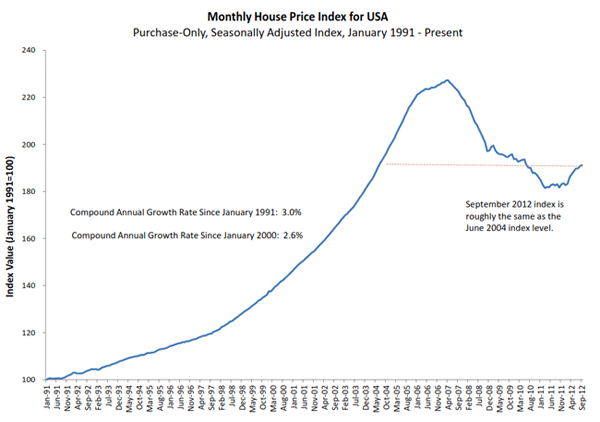|
|
How Far Can We Expect Mortgage Rates to Drop?
 Mortgage rates have started to go back down, thanks mostly to the Federal Reserve's decision to hold off slowing its monthly bond purchases.
Mortgage rates have started to go back down, thanks mostly to the Federal Reserve's decision to hold off slowing its monthly bond purchases.
Mortgage buyer Freddie Mac reports that the average rate on the 30-year loan dropped to 4.32 percent from 4.50 percent last week. The average on the 15-year fixed loan declined to 3.37 percent from 3.54 percent.
Both are the lowest averages since July 25.
Mortgage rates are nearly a full percentage point higher than they were in May, when the Fed first signaled it might slow its $85-billion-a-month in bond buy program. But the Fed kept the pace steady after lowering its outlook for economic growth. The bond purchases are intended to lower long-term interest rates, including mortgage rates.
To calculate average mortgage rates, Freddie Mac surveys lenders across the country Monday through Wednesday each week. The average doesn't include extra fees, known as points, which most borrowers must pay to get the lowest rates. One point equals 1 percent of the loan amount.
So how far can we expect mortgage rates to drop this time? It's pretty much anyone's guess, but experts all seem to be in agreement that we may see rates drop another half to a full point before they level off and start back up again. Remember, at any time, the Fed could reverse their bond purchase program decision, and when that happens, it may be too late for you to do anything about taking advantage of the lower interest rates.
If you've been thinking about looking for a Metro Atlanta home, consider the time it takes to find the right home, in addition to the loan application process. By the time you go through all of that, rates may have fallen as far as they will fall and could even be starting back up again. Now is the time to get off the fence if you've been waiting on mortgage rates.
.
Will Home Prices Rise Next Year?
 It would appear that Americans' love affair with real estate has returned. Most think home prices will go up over the next 12 months, especially upper-middle-income households. This according to a new Bankrate.com report.
It would appear that Americans' love affair with real estate has returned. Most think home prices will go up over the next 12 months, especially upper-middle-income households. This according to a new Bankrate.com report.
Among households earning between $50,000 and $75,000 per year, some 65% expect prices to rise and just 6% expect prices to fall. Twenty-seven percent say they will stay the same and just nine percent forecast a decline.
In July, Bankrate established that 23% of Americans believe real estate is the best way to invest money not needed for more than 10 years. That was the second-most common response, slightly behind cash.
Bankrate found that Americans' financial security turned negative in September for the first time since February. The Financial Security Index slipped from August's 100.5 reading to 99.5 in September. Readings below 100 indicate deteriorating financial security compared with one year previous.
The readings on debt, net worth and overall financial situation dropped from August to September. Americans' comfort level with their debt took the biggest hit; those feeling less comfortable than one year ago (21%) now outnumber those feeling more comfortable (17%).
On a bright note, just one-in-eight employed Americans feel less secure in their jobs now than 12 months ago, a new low since polling began in December 2010.
.
Damage Control After Disaster Strikes
 Last month we covered what to do to prepare for a storm or disaster. This month, let's look at what happens afterwards.
Last month we covered what to do to prepare for a storm or disaster. This month, let's look at what happens afterwards.
Of course, the size and scope of a disaster, be it from Mother Nature, or a fire, determines just how far a homeowner can go in repairing the damage him or herself.
Often times it will be necessary to call in a professional who specializes in disaster restoration. But if the damage is relatively minimal, a homeowner can sometimes handle most – if not all – of it on his or her own.
Before Getting Started:
Before attempting to clean up and repair any kind of damage to your home, there are some basic considerations to take into account. First and foremost, if your disaster comes in the form of fire, it's vital to wait until the fire is completely out before attempting any restoration. Also, if the homeowner has insurance, he or she should contact the insurance company and notify them of the damage. The insurance provider can suggest ways the homeowner should deal with the fallout and they may even be able to recommend a professional fire restoration company.
Prevent Further Damage:
Those who wish to perform cleanup and restoration themselves must first be cleared to enter the home by the fire marshal or other governing emergency agency such as FEMA. The first step after is to get air circulating. Whether it be fire or flood, you want to do what you can do get air moving in the home. That means opening the windows in the home as well as placing a fan near the affected areas in order to help ventilate the area. Wet items should be dried as soon as possible. Dehumidifiers and fans can be used to dry heavier items like drapes and carpeting.
Carpeting:
Carpeting should be cleaned (preferably by a professional) both before and after general fire repairs as well as flood repairs. Some carpeting may require total replacement. The last thing you want is mold growing under your carpet where you don't see it, but where it can still cause your family a great deal of harm.
Cleaning Walls:
If dealing with fire damage, to clean soot stains from walls, it is necessary to use a chemical sponge – available from cleaning supply companies – or even paint thinner or rubbing alcohol.
If you're cleaning walls from a flood, again, it's necessary to know what you're doing to prevent or stop mold. More times than not, if flooding is the issue, you're better off calling in someone who is certified in mold remediation to take care of things for you.
If a smoky smell persist for months, it may be necessary to hire a professional restoration company to perform a thermal fogging, which should permeate the home to the point it kills all smoke odor. The same goes for mold. And understand, mold can appear many months after water damage has long been dried out on the surface.
These are just a few things homeowners can do to reduce the effects of fire or water damage.


 Home prices continue to rise despite higher mortgage rates. The S&P/Case-Shiller home price index was up 12.2% compared to a year ago, slightly better than the 12.1% rise in April. It was the biggest year-over-year jump in prices since March 2006, near the peak of the housing bubble.
Home prices continue to rise despite higher mortgage rates. The S&P/Case-Shiller home price index was up 12.2% compared to a year ago, slightly better than the 12.1% rise in April. It was the biggest year-over-year jump in prices since March 2006, near the peak of the housing bubble. Lenders completed fewer foreclosures in June than they did a year ago, while the number of properties sitting in the foreclosure pipeline also decreased as the housing market continued to improve. There were 55,000 foreclosures finished last month, down from 68,000 in June of last year.
Lenders completed fewer foreclosures in June than they did a year ago, while the number of properties sitting in the foreclosure pipeline also decreased as the housing market continued to improve. There were 55,000 foreclosures finished last month, down from 68,000 in June of last year. When most people think of their credit, they think "loans." Obviously, the condition of your credit will determine whether you get a loan or not, as well as the terms of the loan, IF you qualify.
When most people think of their credit, they think "loans." Obviously, the condition of your credit will determine whether you get a loan or not, as well as the terms of the loan, IF you qualify.


 evidence that the housing market is trying to dig out of the doldrums and set it sites on recovery came out with a panel of 105 professional forecasters projecting home prices will continue to increase in 2013 rising 3.1 percent for the year, according to the December 2012 Zillow Home Price Expectations Survey.
evidence that the housing market is trying to dig out of the doldrums and set it sites on recovery came out with a panel of 105 professional forecasters projecting home prices will continue to increase in 2013 rising 3.1 percent for the year, according to the December 2012 Zillow Home Price Expectations Survey.





 It seems fewer and fewer people are sharing in the American dream these days, whether by choice or circumstance.
It seems fewer and fewer people are sharing in the American dream these days, whether by choice or circumstance. The inventory levels of new homes for sale fell, marking the eleventh consecutive month of decreasing supply levels. The current supply sold at the current sales pace represents a 5.6 month supply, down considerably from the 7.2 month supply just one year ago. Compared to January 2011, the number of new homes sold has risen 3.5 percent nationally with particularly strong sales in the South which has increased 15 percent.
The inventory levels of new homes for sale fell, marking the eleventh consecutive month of decreasing supply levels. The current supply sold at the current sales pace represents a 5.6 month supply, down considerably from the 7.2 month supply just one year ago. Compared to January 2011, the number of new homes sold has risen 3.5 percent nationally with particularly strong sales in the South which has increased 15 percent.
